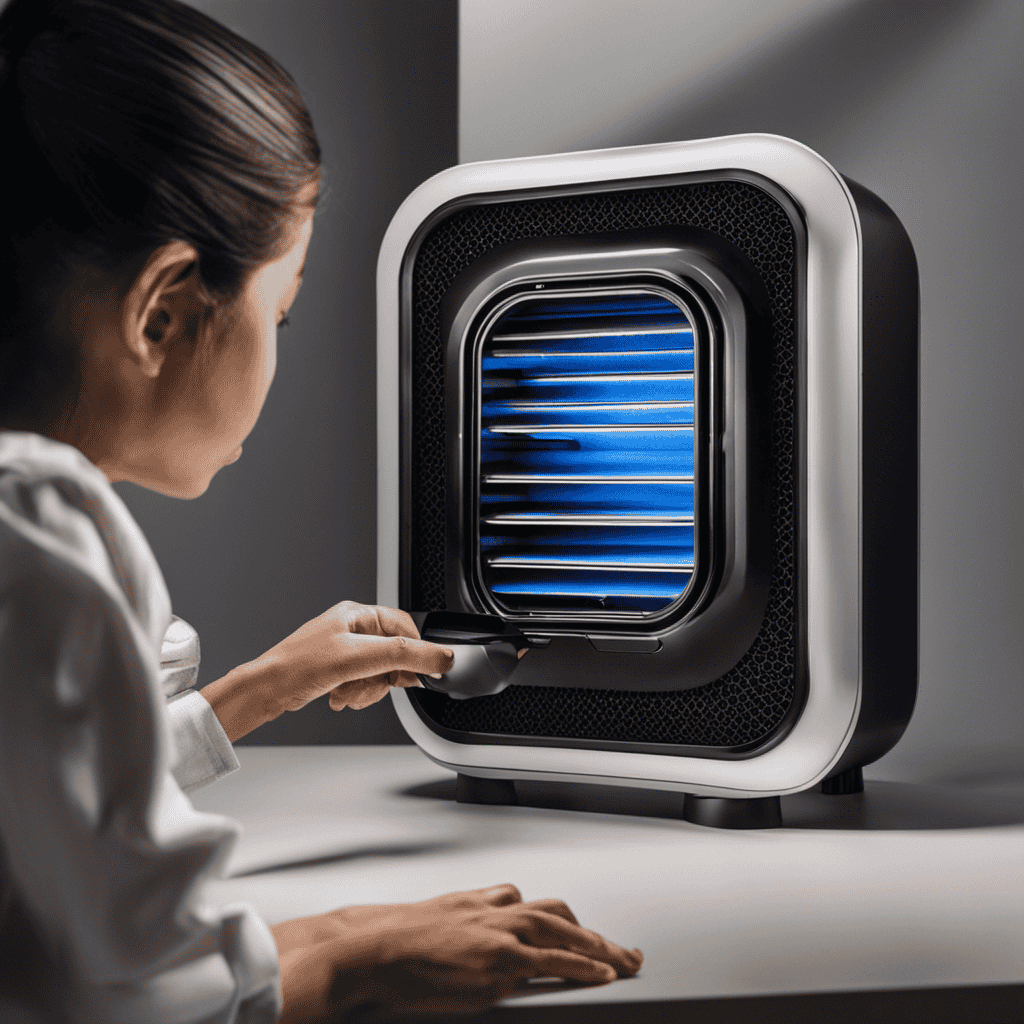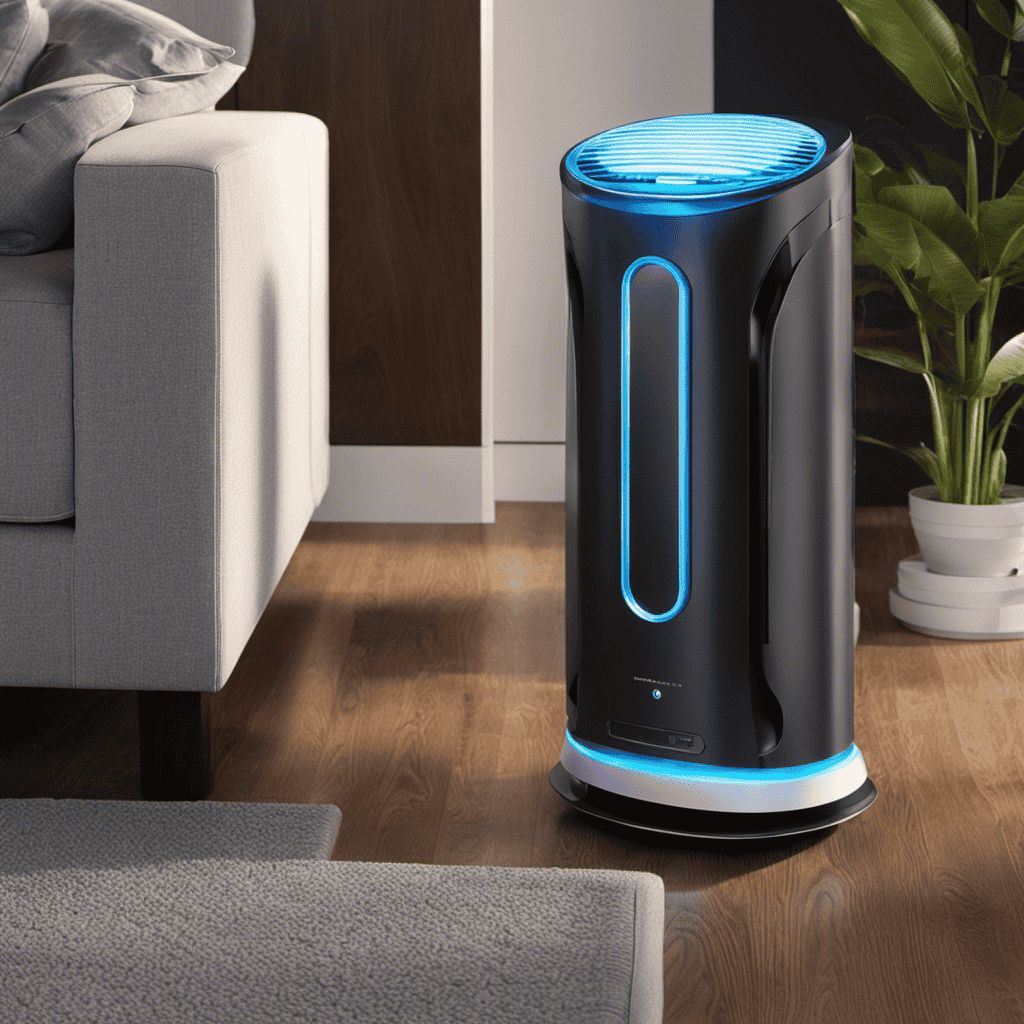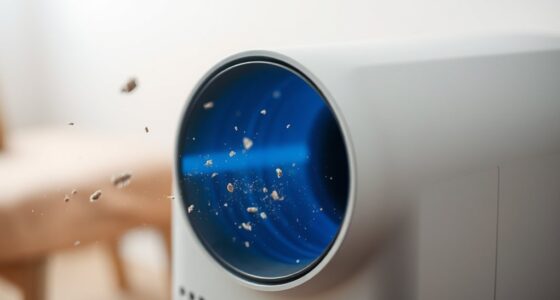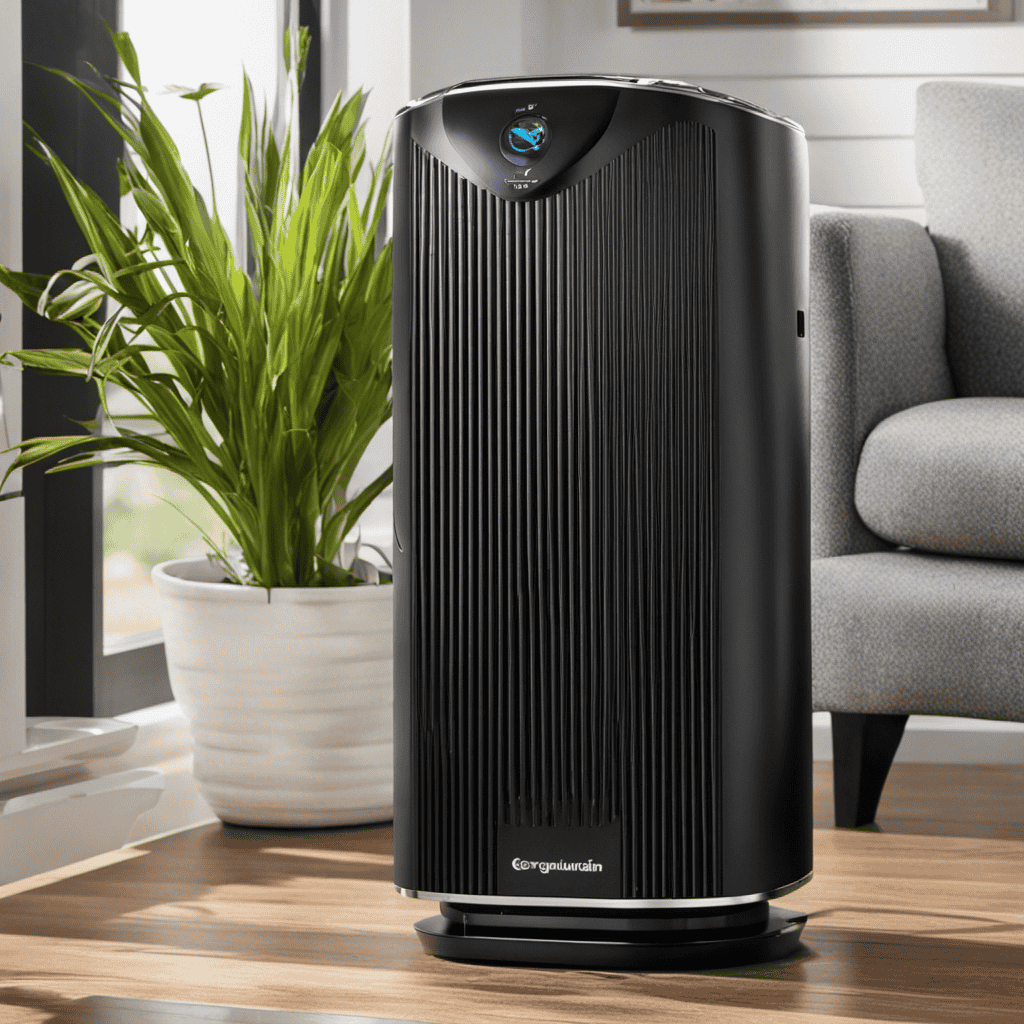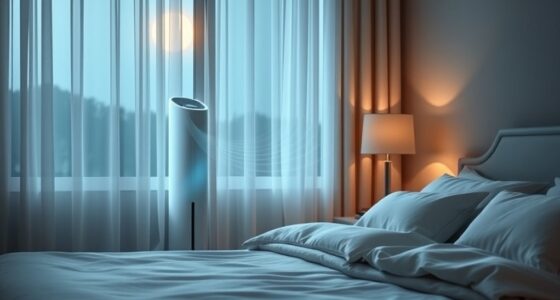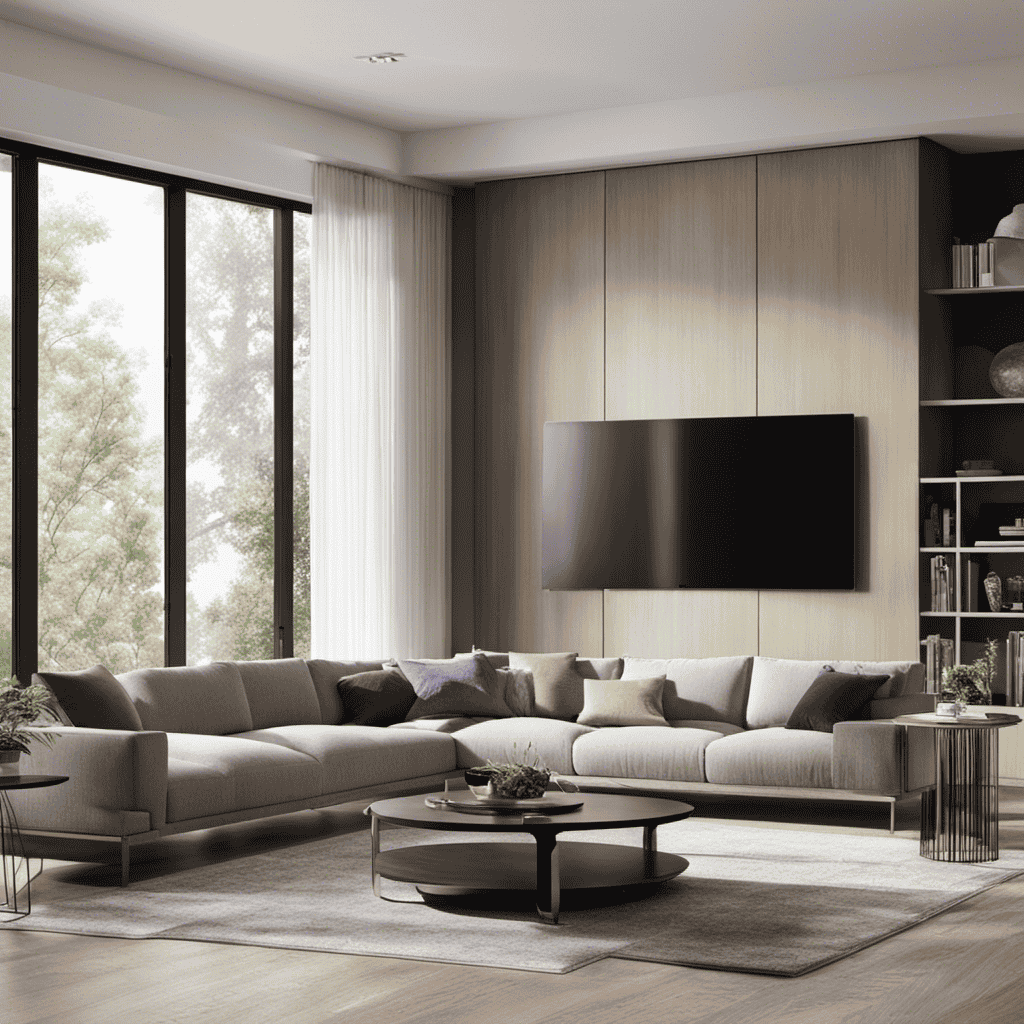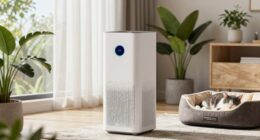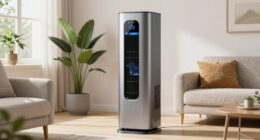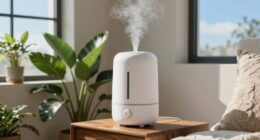As a homeowner, I understand the significance of breathing clean air. That’s why I’m here to offer my expertise on key factors to consider when purchasing an air purifier.
With so many options on the market, it’s crucial to make an informed decision. In this article, I’ll guide you through the cost considerations, types of air purifiers available, filter efficiency, coverage area, noise levels, and additional features.
So let’s dive in and ensure you find the perfect air purifier for your needs.
Key Takeaways
- Consider budget and energy efficiency when choosing an air purifier
- Understand the pros and cons of different purifying technologies
- Decide between air purifiers with filters or filterless options based on maintenance needs and effectiveness
- Choose the appropriate filters and establish a replacement schedule for optimal performance and cost-effectiveness.
Cost and Budget Considerations
When buying an air purifier, you should consider your budget and how much you’re willing to spend. It’s important to find a balance between cost and effectiveness.
One factor to consider is the energy consumption of the air purifier. Look for models that are energy-efficient and have low power consumption to save on electricity bills.
Additionally, maintenance costs should be taken into account. Some air purifiers require regular filter replacements, which can add up over time. It’s worth looking for models with washable or reusable filters to minimize ongoing expenses.
Consider the overall cost of ownership, including both the initial purchase price and long-term maintenance costs, to make an informed decision that aligns with your budget.
Types of Air Purifiers Available
When it comes to choosing an air purifier, two key points to consider are whether it uses a filter or not, and the different purifying technologies available.
Filters are commonly used to trap particles and contaminants in the air, providing cleaner and fresher air in the process.
However, there are also air purifiers that use alternative technologies, such as ionizers or UV-C light, which claim to purify the air without the need for filters.
Understanding the pros and cons of each option can help in making an informed decision on which type of air purifier to invest in.
Filter or No Filter
If you’re considering purchasing an air purifier, one thing you should think about is whether to go for a model with a filter or without.
Both options have their pros and cons, so it’s important to understand the differences before making a decision.
Air purifiers with filters are generally more effective at removing particles and pollutants from the air, providing cleaner and healthier indoor air quality. However, they do require regular maintenance, including replacing the filters every few months.
On the other hand, filterless air purifiers are low maintenance and often more cost-effective in the long run since you don’t have to constantly buy replacement filters. However, they may not be as effective at capturing smaller particles.
Ultimately, the choice between a filter or no filter air purifier depends on your specific needs and preferences.
Different Purifying Technologies
To better understand the different purifying technologies available, you should research and compare the features and benefits of each option. When it comes to air purifier maintenance and air quality improvement, the right technology can make a significant difference.
One popular technology is HEPA filtration, which is highly effective at removing particles as small as 0.3 microns. Another option is activated carbon filtration, which is great for reducing odors and chemicals in the air.
UV-C technology uses ultraviolet light to kill bacteria and viruses, while ionizers release negatively charged ions to attach to airborne particles and make them easier to capture.
It’s important to consider factors like filter replacement frequency, noise level, and energy efficiency when choosing the right purifying technology for your needs. By doing thorough research, you can find an air purifier that will effectively improve your indoor air quality and be easy to maintain.
Filter Efficiency and Replacement Frequency
When it comes to maintaining an air purifier, there are several key points to consider:
-
Choosing proper filters: Proper filters are essential for ensuring efficient filtration of pollutants and contaminants.
-
Establishing an optimal replacement schedule: Establishing a regular replacement schedule ensures that the air purifier continues to operate effectively.
-
Understanding the long-term cost implications: Understanding the long-term cost implications helps in making informed decisions about the overall maintenance and operation of the device.
Choosing Proper Filters
One important factor to consider when buying an air purifier is the type of filters it uses. The filters play a crucial role in capturing and eliminating pollutants from the air, ensuring that you breathe in clean and healthy air.
Here are three key things to keep in mind when choosing the right filters for your air purifier:
-
HEPA vs. Activated Carbon: HEPA filters are highly effective in removing particles as small as 0.3 microns, including dust, pet dander, and pollen. On the other hand, activated carbon filters excel at removing odors, chemicals, and volatile organic compounds (VOCs).
-
Air Quality Standards: Look for air purifiers that meet or exceed industry standards for air purification, such as CADR (Clean Air Delivery Rate) and ACH (Air Changes per Hour). These standards ensure that the air purifier is capable of efficiently cleaning the air in your space.
-
Combination Filters: Consider air purifiers that use a combination of filters, such as HEPA and activated carbon, to provide comprehensive air purification. This will ensure that both particles and odors are effectively removed from the air.
Choosing the right filters for your air purifier is essential for achieving optimal air quality in your home or office. Once you have the right filters, it is equally important to establish an optimal replacement schedule to maintain the efficiency of your air purifier.
Optimal Replacement Schedule
When it comes to air purifiers, one important consideration is the lifespan of the filters and the maintenance requirements they have. Filters play a crucial role in trapping and removing pollutants from the air, but they can become less effective over time. It’s essential to follow an optimal replacement schedule to ensure the air purifier continues to perform at its best. Below is a table outlining the recommended lifespan and maintenance requirements for different types of filters:
| Filter Type | Lifespan | Maintenance Requirements |
|---|---|---|
| HEPA Filters | 6-12 months | Regular vacuuming or washing |
| Carbon Filters | 3-6 months | Replacement |
| Pre-Filters | 1-3 months | Vacuuming or washing |
| UV Filters | 6-12 months | Replacement |
Long-Term Cost Implications
To ensure you understand the long-term cost implications, it’s important to consider factors like filter replacement and energy consumption. Here are three key points to keep in mind when evaluating the maintenance requirements and energy consumption of an air purifier:
-
Filter Replacement: One of the most important maintenance requirements is the regular replacement of filters. It’s crucial to check the filter lifespan and cost before purchasing an air purifier. Some filters may need to be replaced every few months, while others can last up to a year. Consider the cost and availability of replacement filters to avoid unexpected expenses.
-
Energy Consumption: Another important factor to consider is the energy consumption of the air purifier. Look for models that are energy-efficient and have low power consumption. This will not only help you save on electricity bills but also contribute to reducing your carbon footprint.
-
Additional Maintenance: Apart from filter replacement, some air purifiers may require additional maintenance, such as cleaning the unit or replacing other parts. Consider the time and effort required for these tasks when making your decision.
Coverage Area and Room Size
The coverage area and room size are important factors to consider when purchasing an air purifier. You want to make sure that the air purifier you choose is capable of covering the maximum area of your room.
To determine the maximum coverage, you need to know the dimensions of your room. Measure the length, width, and height of the room, and then multiply these measurements together to calculate the total volume.
Most air purifiers will specify the maximum coverage area in their product description. It is important to choose an air purifier that can effectively filter the air in your room, so make sure to consider the room size and dimensions when making your decision.
Noise Levels and Operation Modes
When it comes to air purifiers, noise levels and operation modes are important factors to consider. Here’s what you need to know:
-
Silent Operation: Look for air purifiers that have a silent or whisper-quiet mode. This is especially important if you plan to use the purifier in your bedroom or office, where noise can be distracting.
-
Energy Consumption: Consider the energy efficiency of the air purifier. Look for models that have an energy-saving mode or are ENERGY STAR certified. This will not only help you save on your electricity bill but also reduce your environmental impact.
-
Operation Modes: Check if the air purifier offers different operation modes. Some models have a sleep mode, which operates quietly and dims the lights, making it perfect for nighttime use. Others have a turbo mode for quick air purification when needed.
Now that we’ve covered noise levels and operation modes, let’s dive into the additional features and technology advancements you should be aware of.
Additional Features and Technology Advancements
Now that we’ve covered noise levels and operation modes, let’s explore the extra features and technological advancements you should be aware of. When it comes to air purifiers, there are several additional features that can enhance your overall experience and improve the quality of air in your home. One important feature is smart home integration, which allows you to control and monitor your air purifier using your smartphone or voice commands. This convenient feature allows you to adjust settings, check air quality, and schedule cleaning cycles from anywhere. Another important advancement is the inclusion of air quality sensors. These sensors detect pollutants and allergens in the air, and automatically adjust the purifier’s settings to ensure optimal performance. This ensures that you and your family breathe in clean and healthy air at all times. To help you understand the various features available, here is a table summarizing some key features to look out for:
| Feature | Description | Benefit |
|---|---|---|
| Smart Home Integration | Allows control and monitoring of air purifier using smartphone or voice commands | Convenient and easy to use |
| Air Quality Sensors | Detects pollutants and allergens in the air and adjusts purifier’s settings accordingly | Ensures optimal air cleaning performance |
| Filter Replacement | Indicates when it’s time to replace the filters for effective air purification | Ensures the air purifier is always working at its best and maintains clean air quality in your home |
Considering these additional features and technological advancements when buying an air purifier will help you find the best one for your needs and ensure a healthier living environment.
Frequently Asked Questions
Are Air Purifiers Effective in Removing All Types of Pollutants, Including Gases and Odors?
Yes, air purifiers are effective in removing all types of pollutants, including gases and odors. Regular air purifier maintenance ensures optimal performance. Using air purifiers benefits indoor air quality by reducing allergens and improving overall respiratory health.
Can Air Purifiers Help Reduce the Symptoms of Respiratory Conditions Such as Asthma and Allergies?
Air purifiers can help reduce symptoms of respiratory conditions like asthma and allergies. They improve indoor air quality by removing pollutants, which can lead to better sleep quality and overall health.
Do Air Purifiers Require Any Regular Maintenance or Cleaning?
Regular maintenance and cleaning are essential for air purifiers to function effectively. Neglecting these tasks can lead to a decrease in performance and potential health risks. Stay on top of upkeep to ensure clean and fresh air.
Are There Any Health Risks Associated With Using Air Purifiers?
There can be potential side effects and safety concerns when using air purifiers. It’s important to be aware of these risks and take necessary precautions to ensure the health and well-being of those using them.
Can Air Purifiers Help Eliminate Viruses and Bacteria From the Air?
Yes, air purifiers can help eliminate viruses and bacteria from the air. They are effective in reducing the spread of diseases, but it’s important to note that they should not replace other preventive measures like wearing face masks.
What Features Make the Top-rated Air Purifier According to Consumer Reports?
According to consumer reports, top air purifiers are characterized by high CADR (Clean Air Delivery Rate) for dust, pollen, and smoke, as well as efficient HEPA filters to capture small particles. Additionally, they offer quiet operation, low energy consumption, and user-friendly controls.
Conclusion
After carefully considering all the factors, I’ve come to the conclusion that buying an air purifier is like investing in a guardian for your indoor air quality. It may seem like a simple purchase, but the benefits it brings are invaluable.
Just like a loyal companion, a good air purifier protects you from harmful pollutants, ensuring the air you breathe is clean and fresh. So, don’t overlook the importance of choosing the right one.
Take your time, do your research, and find the perfect guardian for your sanctuary.
